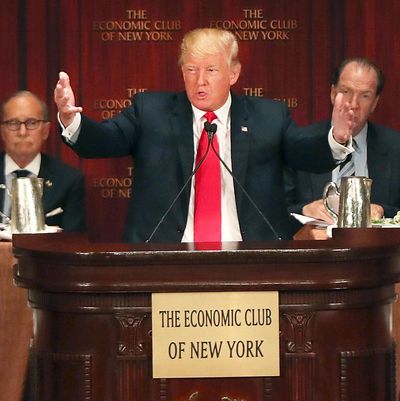
Donald Trump poses an extraordinary threat to American democracy. During the presidential campaign, Hillary Clinton focused on his extraordinary qualities — the bullying, overt racism and misogyny, and authoritarianism — rather than his ordinary ones, like his plans to cut taxes for the rich and deregulate business. Now that the bullying authoritarian has won the presidency, the question changes to how to stop him from abusing his power in a Berlusconi-esque, or even Putin-esque, fashion. Lee Drutman and Mark Schmitt suggest that Democrats in Congress should focus on the safeguarding of norms and democracy, rather than fighting “regular” political battles on issues such as taxes, spending, and regulation. Since autocracy poses the more dire and potentially irreversible threat, they reason, that ought to receive priority: “Challenging Trump primarily on ‘normal politics’ — legislative fights over safety net programs and taxes — is like ignoring a cancer diagnosis and instead devoting all your time to going to your chiropractor because in the past, he’s succeeded at getting rid of your sore back.”
This might be a sensible way to proceed if you think of the problem as though Trump has rigged firebombs to destroy the Constitution in one location and health insurance for 20 million people in another, and opponents face the diabolical question of choosing which one to save:
(Hopefully this hypothetical does not give Steve Bannon any ideas.)
But the actual calculation facing Trump’s opponents is different. They don’t need to choose whether to defend democratic norms or the regulatory and welfare states. They can, and must, defend both.
To be fair to Drutman and Schmitt, who are both very smart analysts, their case does not rest on the simple assumption that Democrats have to choose where to apply limited resources. They argue instead that fighting Trump on economics will impair their ability to fight him on democratic norms, since a policy fight will draw to his side Republican allies who might otherwise oppose his autocratic and kleptocratic governing style. “Making the fight about entitlements and taxes is only going to reinforce existing partisan divides,” they argue, “at a time when Democrats and Republicans need to figure out how to build alliances to minimize the damage Trump can do to basic norms, rather than reinforcing the divide that Trump exploited in the general election.”
But it seems clear that Trump has maintained conflicts of interest between his business and office that are orders of magnitude larger than what used to be considered a major scandal, a state of affairs Republicans have almost entirely ignored. Republicans have refused to support a special committee on Russian hacking that would give subpoena power to Democratic as well as Republican chairs, and allowed Trump’s nominees to flout disclosure requirements. James Inhofe actually admitted to reporters that he opposes disclosure of financial interests by presidential nominees now, after having supported them in the past, entirely because the nominees were now of his party.
Over the last couple of decades, appealing to the consciences of Republican legislators has not been a strategy with an encouraging record of success. Republicans in Congress support Trump because it is in their political interest to do so — he is popular with the base, and they face a much greater risk in opposing him than in supporting him. An excellent way to change this is to attack Trump on economics. Indeed, the entire GOP is rife for attack. Trump enters office with extraordinarily low political capital and an approval rating below 40 percent, which is unheard-of for a not-yet-inaugurated president who can still promise to be all things to all people. To the very limited extent that he had any positive appeal to swing voters (as opposed to simply being less hated than Hillary Clinton), it was because he was seen as antithetical to the normal plutocratic Republican agenda.
And yet Trump and his Republican allies are carrying out an agenda diametrically opposed to the populist image he cultivated. They are busily deregulating Wall Street, cutting taxes for the rich, throwing working-class people off their health insurance. That agenda is easy to connect to the corrupt cast of his administration, which is staffing up with lobbyists and insiders who are using their power to enrich themselves and their partners. Trump and his party are supplying Democrats with a simple, easy-to-understand frame of opposition that has the virtue of being completely true.
Republicans in Congress don’t care right now about defending political norms because the public doesn’t care much about political norms. That doesn’t make it pointless for opponents, big-D Democrats and small-d democrats, to raise a fuss about them. But realistically, Republicans won’t defect until political survival demands they do so. And the path to that outcome runs through exposing Trump as a corrupt handmaiden of wealth.






























